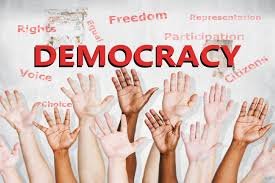
Democracy in Srilanka
Democracy in Sri Lanka has faced significant challenges, particularly in recent years. While the country has a history of democratic governance, various factors have contributed to concerns about its quality and functionality:
1. **Political Instability**: Sri Lanka has experienced political turmoil, including frequent changes in government and leadership crises. This instability can undermine public confidence in democratic institutions.
2. **Authoritarian Tendencies**: There have been concerns about increasing authoritarianism, particularly under certain administrations. This includes attempts to consolidate power, weaken checks and balances, and undermine the independence of key institutions like the judiciary.
3. **Human Rights Violations**: Reports of human rights abuses, including suppression of dissent, harassment of journalists, and discrimination against minority communities, have raised alarms about the state of democracy in the country.
4. **Freedom of Expression**: Journalists and activists often face intimidation and censorship, limiting their ability to report freely and hold the government accountable. The media landscape has been described as constrained, with significant risks for those who criticise the government.
5. **Ethnic and Religious Tensions**: Sri Lanka’s complex ethnic landscape, particularly the historical tensions between the Sinhalese majority and Tamil and Muslim minorities, can exacerbate political divisions and impact democratic processes.
6. **Electoral Integrity**: Concerns have been raised about the integrity of elections, including issues related to voter suppression, electoral violence, and the influence of money in politics. This can compromise the fairness and transparency of the electoral process.
7. **Public Discontent**: Economic challenges, including inflation and unemployment, have led to widespread public discontent, which can impact political stability and the functioning of democracy. Protests and calls for reform have highlighted the need for change.
8. **Limited Civil Society Space**: Civil society organisations that play a critical role in promoting democracy and human rights often face restrictions, limiting their ability to operate freely and advocate for change.
While Sri Lanka has democratic frameworks in place, the combination of these challenges has raised concerns about the health of its democracy. Ongoing efforts to promote accountability, human rights, and political reform are essential for strengthening democratic governance in the country.






